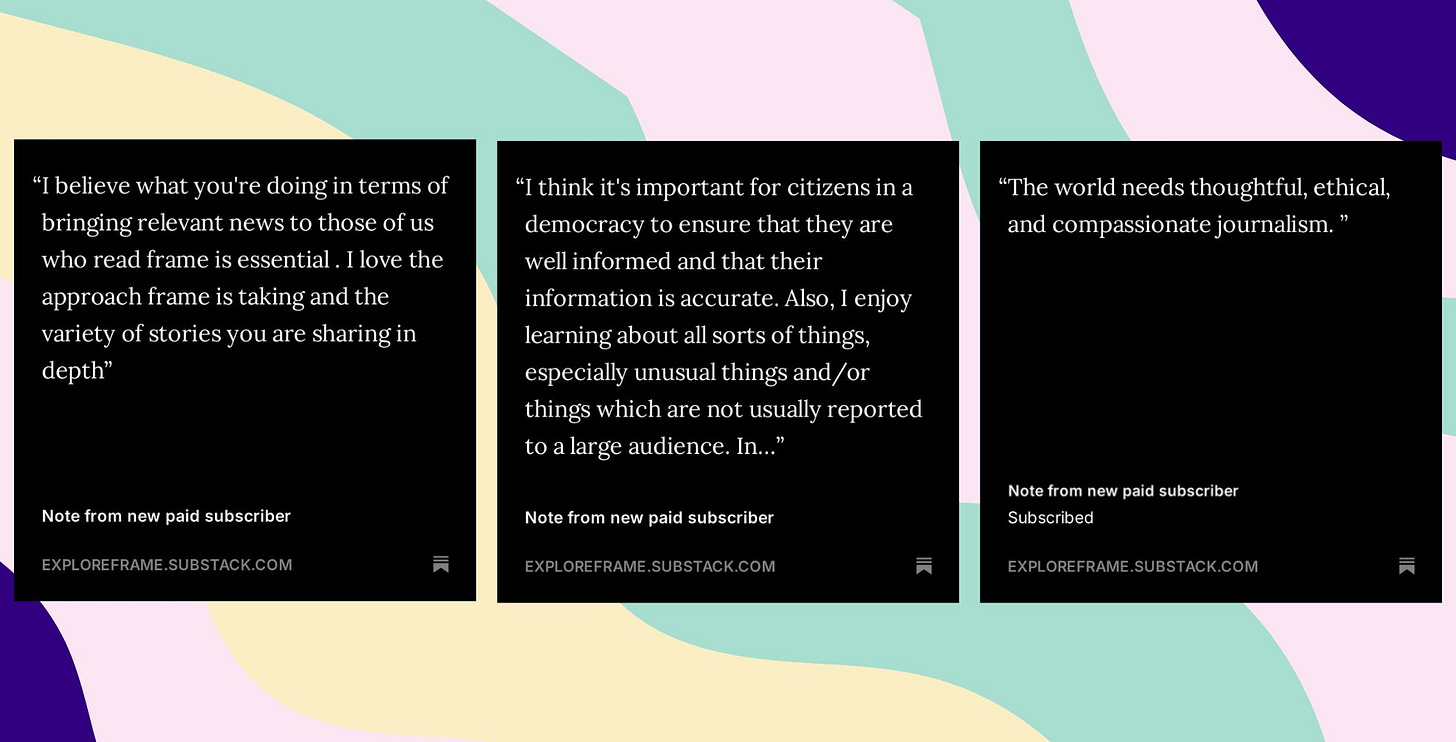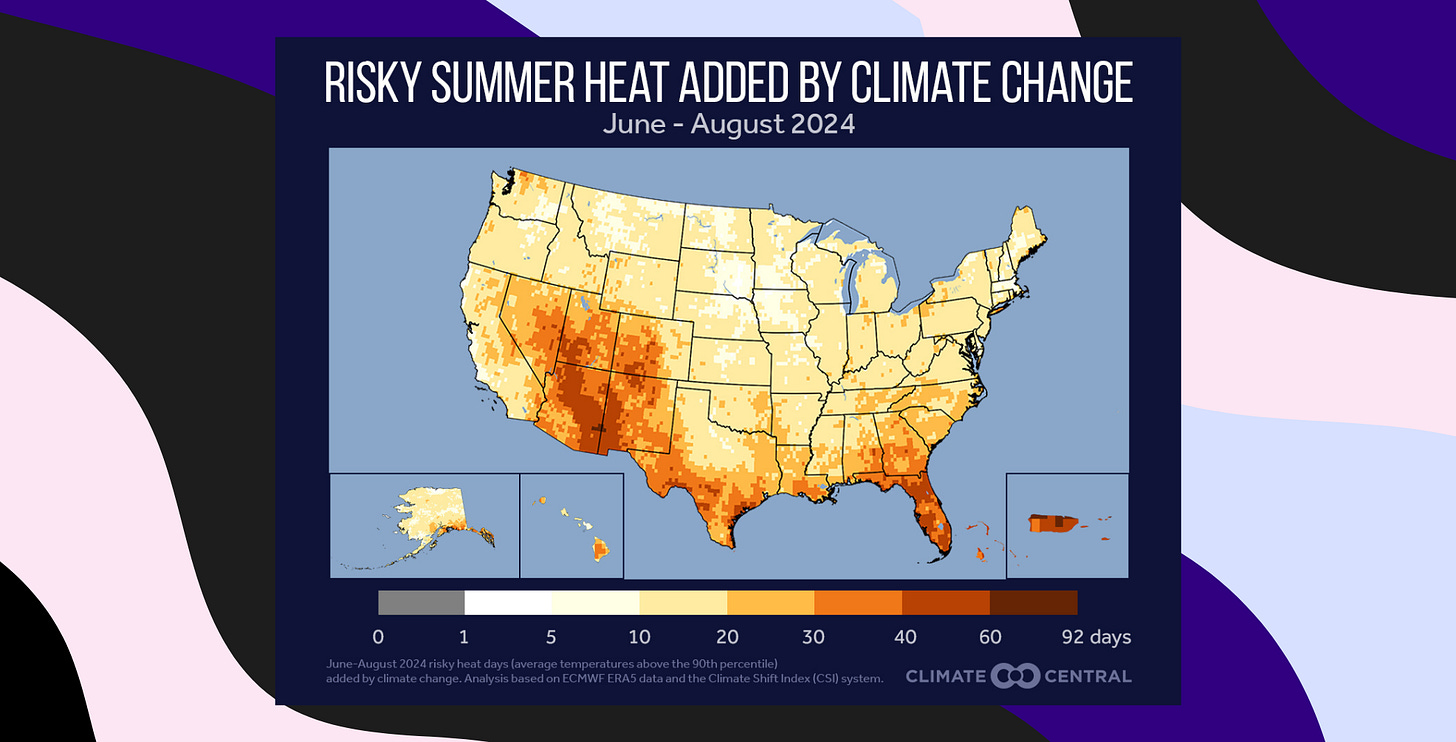We're in Oppenheimer's world. A new UN treaty hopes to change that.
… plus curiosities from Korean Hollywood, heat maps, and more.
Welcome back to another edition of The Detour! My name is Kelly, and I’m the newsletter’s founding writer. Before I get to the good stuff, I wanted to share some Frame Media lore: On a cold weekday in January earlier this year, I sat down with colleagues Ben Moe and Jeremy Siwik to create something we knew our readers deeply valued: An honest, dynamic, and engaging news product that would cut through the noise of the internet and deliver journalism that sparks curiosity from all corners of the globe. We wanted to build a space that illuminated the consequential ripples of the world’s major news events while highlighting Frame’s award-winning feature storytelling.
Cut to today: The Detour is our storytelling flagship, and it is sent to a global community of 26,000 strong. Here’s what our readers are saying:

If you haven’t yet, we invite you to join our community of curious and informed readers who keep The Detour running with a paid subscription of $5/month or $50/year. If there’s something you think we’re missing that could motivate your support of our work, I’m all ears! Please email me your thoughts, concerns, and pie-in-the-sky ideas at kelly@frame.media and I’ll get back to you as soon as I can.
And if you’ve loved what we’ve been up to in this corner of the internet, please consider giving our newsletter a shout-out to your friends:
Thank you for reading,
Kelly
We’re back after taking the week off last week. Without further ado, here’s what’s on deck:
🗒️ On the ground at the United Nations General Assembly (UNGA)
👀 Predicting the rise of Korean Hollywood — and other cultural curiosities
👾 Feelin’ lonely in cyberspace
2035 — The year South Korea’s new Hollywood-esque entertainment hub is expected to welcome tourists, according to an announcement by the South Korean government this month. The proposed 3.3-square-kilometer development will host academic institutions specializing in entertainment, a K-pop group “incubator,” and state-of-the-art production facilities, including replicas of Joseon dynasty palaces for production purposes.
Netflix has bet big on K-content: In April 2023, Netflix doubled down on South Korean entertainment with a $2.5 billion investment over the next four years. With that money, the streaming giant wants to see even more K-dramas, movies, and reality shows, likely in hopes to capitalize on the global affinity for recent Korean-led hits like Squid Game and Crash Landing on You.
1000 — The number of nuclear warheads that China will have in its arsenal by 2030, according to a 2023 report by the Pentagon. It takes fissile material like highly enriched uranium and plutonium to make these weapons, and the world’s nuclear arms states have “more fissile material than they know what to do with,” the nuclear arms control expert and Executive Director of the Arms Control Association Daryl Kimball tells me. (We have no relation despite having the same last name.) Here’s a closer look at all the countries that are suspected or are known to have nuclear weapons.

On Monday Japan invited 11 allies to re-start discussions on banning the production of key ingredients needed to make nuclear weapons. More on that, in this week’s cover story.
21x — The rate at which extreme heatwaves of five or more days are now more likely because of climate change, according to new research released by Climate Central (CC) this month.
The research behind extreme heat: Climate scientist Andrew Pershing spoke with me about CC’s latest report and a tool his team made called the Climate Shift Index, which quantifies how climate change has transformed conditions in the atmosphere and ocean. His team found that this summer was the hottest in the Northern Hemisphere on record, and July 22 was the hottest day of this year. On that day, 3.6 billion people worldwide (a whopping 45% of the global population) experienced “unusual” heat that exceeded the historical average in local temperatures.
Pershing’s research takes stock of temperature changes relative to what’s “normal” for a city or region. For example, an 80-degree day in London, England, would be considered a life-threatening heat wave, but an 80-degree day in Nairobi, Kenya, is less impactful on locals.
“What we see all over the world in these health studies is that if you push people beyond the temperatures where they're accustomed — both their bodies and the cities and houses that they live in — that's where you start to see people getting sick and people dying,” Pershing tells me.
This summer proved Pershing’s point: From June to August, 180 cities in the Northern Hemisphere had at least one dangerous extreme heat wave relative to typical conditions. You can look closer at CC’s research here.
There’s so much more to The Detour this week. Further down, I chat with nuclear experts like Dr. Frank Von Kippel, who’s an American physicist that advised Mikhail Gorbachev on the steps to deescalate the nuclear arms race and has shaped the last 30-or-so years of international negotiations to realize a world without nuclear weapons. Subscribe below for a free seven-day trial to keep reading.
Keep reading with a 7-day free trial
Subscribe to The Detour by Kelly Kimball to keep reading this post and get 7 days of free access to the full post archives.








